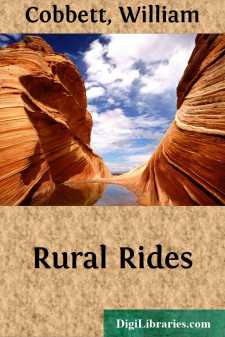Categories
- Antiques & Collectibles 13
- Architecture 36
- Art 48
- Bibles 22
- Biography & Autobiography 813
- Body, Mind & Spirit 142
- Business & Economics 28
- Children's Books 17
- Children's Fiction 14
- Computers 4
- Cooking 94
- Crafts & Hobbies 4
- Drama 346
- Education 46
- Family & Relationships 57
- Fiction 11829
- Games 19
- Gardening 17
- Health & Fitness 34
- History 1377
- House & Home 1
- Humor 147
- Juvenile Fiction 1873
- Juvenile Nonfiction 202
- Language Arts & Disciplines 88
- Law 16
- Literary Collections 686
- Literary Criticism 179
- Mathematics 13
- Medical 41
- Music 40
- Nature 179
- Non-Classifiable 1768
- Performing Arts 7
- Periodicals 1453
- Philosophy 64
- Photography 2
- Poetry 896
- Political Science 203
- Psychology 42
- Reference 154
- Religion 513
- Science 126
- Self-Help 84
- Social Science 81
- Sports & Recreation 34
- Study Aids 3
- Technology & Engineering 59
- Transportation 23
- Travel 463
- True Crime 29
William Cobbett
William Cobbett (1763–1835) was an influential English writer, political reformer, and pamphleteer known for his outspoken criticism of corruption and injustice. He authored the famous work "Rural Rides," chronicling his observations of rural England, and was a passionate advocate for agricultural workers' rights. Cobbett also published "The Political Register," a journal that became a major voice for reform and gained a mass readership among working-class people. His views and writings were often controversial, but they played a significant role in shaping public opinion during a time of political and social change in Britain.
Author's Books:
Sort by:
by:
William Cobbett
INTRODUCTION 1. It is the duty, and ought to be the pleasure, of age and experience to warn and instruct youth and to come to the aid of inexperience. When sailors have discovered rocks or breakers, and have had the good luck to escape with life from amidst them, they, unless they be pirates or barbarians as well as sailors, point out the spots for the placing of buoys and of lights, in order that...
more...
by:
William Cobbett
Fog that you might cut with a knife all the way from London to Newbury. This fog does not wet things. It is rather a smoke than a fog. There are no two things in this world; and, were it not for fear of Six-Acts (the “wholesome restraint” of which I continually feel) I might be tempted to carry my comparison further; but, certainly, there are no two things in this world so dissimilar as an English...
more...
by:
William Cobbett
INTRODUCTION. To the Labouring Classes of this Kingdom. 1. Throughout this little work, I shall number the Paragraphs, in order to be able, at some stages of the work, to refer, with the more facility, to parts that have gone before. The last Number will contain an Index, by the means of which the several matters may be turned to without loss of time; for, when economy is the subject, time is a thing...
more...




